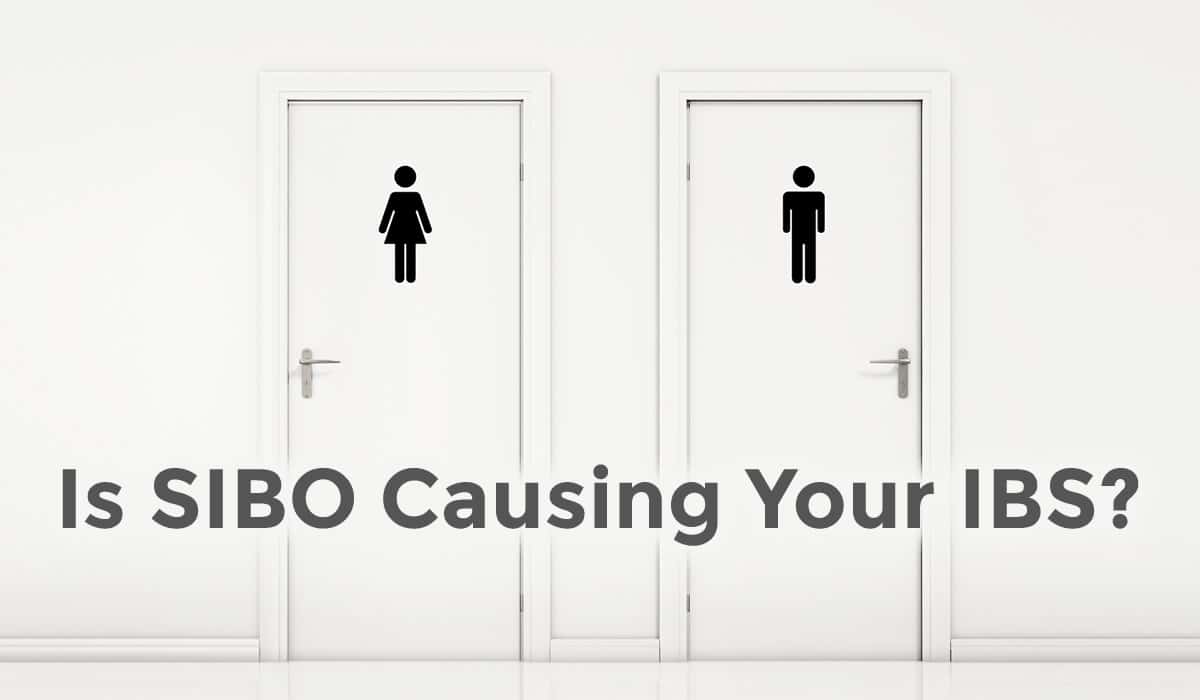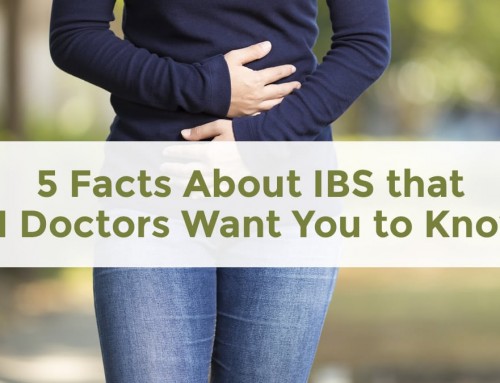You feel like you’ve tried everything to reduce your IBS symptoms.
Given up fast food? Check.
Cut out gluten? Check.
Tried expensive yogurt? Check.
Had a few sessions of acupuncture? Check.
Taken the tablets your doctor prescribed – even though you hate the side-effects? Check.
But none of it is working. You’ve lost a few pounds, but the pain still strikes a few hours after you’ve eaten – seemingly for no reason. You’re still rushing to the bathroom, and the bloating is terrible – you’ve given up on ever fitting back into your favorite jeans. You’re desperate for a change.
What would you say if I told you there may be an underlying reason for your inflammatory bowel syndrome? And it could be as simple as taking a simple test to discover a new way to manage your IBS.
What Is SIBO?
Small intestine bacterial overgrowth (SIBO) is a gastrointestinal disorder where there’s a build-up of bacteria in the small intestine. The definition of SIBO is an increase in the number and/or alteration in the type of bacteria in the upper gastrointestinal tract.
Normally, your small intestine is able to move bacteria down into your colon with the muscular action it uses to push food in the same direction. When this action is interrupted, it can cause a build-up of bacteria, and the one-way system breaks down. So bacteria can move from the colon back up to the small intestine. As your small intestine is concerned mostly with breaking down food, the bacteria gets to work consuming important nutrients before they can be absorbed through the bowel wall.
What Are the Causes of SIBO?
SIBO causes include:
- Poor intestinal motility – triggered by slower muscle contractions or physical blockage.
- Insufficient digestive enzymes – If your pancreas isn’t making enough digestive enzymes it can slow down your digestion considerably.
- Celiac disease – If you have celiac disease it can affect your intestinal motility for the worse.
- A compromised immune system – where your immune system is unable to keep the bacteria in check.
The increased activity of bacteria in your small intestine cause uncomfortable symptoms as they feast on the food you should be digesting. They turn the nutrients into gas through fermentation, while weakening the mucosa and gut wall. So SIBO has the potential to cause malabsorption issues alongside uncomfortable digestion symptoms.
How Is SIBO Diagnosed?
Small intestine bowel overgrowth can be diagnosed with a hydrogen breath test (HBT), which is much less invasive than taking a sample of small bowel fluid. We test for hydrogen in your breath at specific times after you have a drink or eat some food. If you have SIBO, the bacteria get to work fast converting the food into hydrogen, which your body tries hard to remove from your body – it’s moved through your bloodstream to your lungs which expel the gas.
Diagnosis of SIBO shouldn’t be down to just one test. Your gastroenterologist should ask you questions about the onset of your symptoms, the food you eat, and any changes in your stools.
SIBO Treatments
The best way to treat your small intestine bowel overgrowth is by making lifestyle changes that can heal the underlying reasons for the condition.
To treat your SIBO, I recommend:
- Making dietary changes – A SIBO diagnosis is associated with a diet high in carbohydrates and refined sugar. The bad bacteria loves to feast on sugars! So I ask my patients to focus more on “real” food – using good quality ingredients and focusing on eating a wide variety of veggies. Some patients benefit from eating a low-FODMAPs diet, but always consult a doctor before making major changes to your diet.
- Taking Atrantil – Atrantil is a natural and gentle over-the-counter product that can remove unwanted bacteria from your small intestine, with few side effects.
- Visiting a doctor for an antibiotic prescription – As you want to focus on killing off the offending bacteria and not your whole gut microbiome, it’s important you work together to figure out the type of antibiotic best for the job.
What Is IBS?
Inflammatory bowel syndrome (IBS) is a name given to a group of gastrointestinal symptoms involving abdomen pain and a sudden change in your poop. As it’s classed as a chronic health condition, management is usually focused on minimizing your symptoms through lifestyle changes. I always recommend seeing a doctor if you experience a sudden change in bowel movement or abdominal pain, just to discount other diseases.
Causes of IBS
Although the exact cause of inflammatory bowel syndrome is unknown, recent research suggests that there may be a number of factors that trigger the symptoms.
Common triggers of IBS include:
- Diet – While there is no one food that IBS patients should all avoid, lactose and gluten, FODMAPs, and flatulence-inducing foods are common culprits. Skipping meals can also worsen symptoms.
- Stress – Though you may think stress is all in the mind, it has a huge effect on the rest of your body. Perceived stress triggers your hypothalamic pituitary adrenal (HPA) axis and the resultant levels of cortisol affect your digestive system for the worse. Unfortunately, it’s also a feedback loop, as your gut communicates with your brain through the gut-brain axis. So an unhappy gut can lead to an unhappy brain.
- Medication – Sadly, many medications that are prescribed to improve your health come with side-effects. Gastrointestinal distress is a common listed side-effect in many prescribed and over-the-counter medicines: including NSAIDs, antacids, and antidepressants. Don’t stop taking anything your doctor has prescribed you without consulting them first.
If you suspect you have IBS it may be wise to start a diary recording your food, points of stress, and use of medication to see if there’s a link.
How Is IBS Diagnosed?
Irritable bowel syndrome should be diagnosed through the Rome III criteria – once other diseases have been ruled out. So while I keep an eye on the Rome III criteria when you describe your symptoms, there’s a few different tests needed to ensure your symptoms are relatively benign.
I typically check you over in the following ways:
- Physical exam – I’m able to check over your stomach to ensure there’s no hard areas, and that your pain is digestive based.
- Blood test – A routine test I use to screen for Celiac Disease.
- Endoscopy – An exam to confirm a positive blood test for Celiac Disease. Celiac Disease can cause a worn away gut wall which we need to check for.
- Colonoscopy – I use this exam to rule out colon polyps and colon cancer.
I believe it’s important to have a thorough check-up when it comes to IBS symptoms, both for peace of mind, and to ensure we’re not missing something more serious.
IBS Treatments
Inflammatory bowel syndrome treatment should be focused mostly on minimizing the impact of the underlying causes – which usually involves some lifestyle changes – and commitment to these changes.
I usually recommend the following actions:
- Make dietary changes – it’s crucial to identify and eliminate your trigger foods so you can stop dreading mealtimes and the hours after. I recommend an elimination diet, under supervision, which is a great short-term way of working out your food triggers.
- Reduce your stress – I don’t blame you if you laugh incredulously at the thought of reducing your stress – it’s hard! But you only get one life, and if you spend most of your time feeling overwhelmed and panicky, it’s no life at all. You have two options – change your job or living situation, or the easier option, which is to learn better coping mechanisms. Using a mixture of mindfulness, talking therapy, CBT, and meditation may help reduce your IBS symptoms – and make you happier in yourself.
- Take medication – depending on the type of IBS diagnosis, you may be able to take a medicine that slows down or speeds up your digestion – or a low dose of antidepressant that can reduce abdominal pain symptoms if diet changes haven’t worked.
Sometimes these treatments aren’t as effective as I would like, and there’s a good reason…
Symptoms of SIBO and IBS
So SIBO and IBS are both diseases that occur in the gut. But how similar are they really? Let’s compare the symptoms.
SIBO symptoms include:
- Bloating
- Diarrhea
- Flatulence
- Abdominal pain
- Constipation
IBS symptoms include:
- Bloating
- Diarrhea
- Flatulence
- Abdominal pain
- Constipation
So it turns out both diseases manifest similar symptoms. But remarkably when a patient presents with this set of symptoms, it’s rare for them to be offered a hydrogen breath test to check for SIBO. Is IBS over diagnosed?
Can SIBO Cause IBS?
For a long time we didn’t know what causes IBS. There are some people with a predisposition to IBS – possibly genetic – but it lies dormant until triggered. Amazingly, we’re only just beginning to identify some of the possible triggers, but they include medications, infection, stress, major life events – and SIBO.
SIBO can be implicated in malabsorption of nutrients and the metabolism of nutrients, small bowel inflammation, leaky gut, and triggering an overactive immune system response in the gut. We definitely need more research on the topic, but my “gut” feeling is that any of these mechanisms can lead to developing IBS.
So, can SIBO be the cause of your IBS? My experience has led me to believe that many patients diagnosed with IBS often have undiagnosed SIBO – or may be struggling with carbohydrate malabsorption, undiagnosed Celiac disease, or undiagnosed pancreatic insufficiency.
There are many possible causes of IBS-like symptoms, and if you’ve not had a complete work-up it’s difficult to pinpoint what’s going on with your health. Patients deserve a doctor that doesn’t use IBS as a trash-can diagnosis, and is interested in figuring out the underlying issues. If you suffer from IBS symptoms and your doctor hasn’t ruled out SIBO, you should ask to be tested.
I firmly believe that more care taken with testing and diagnosis can save my patients a lot of time, pain and discomfort in the long-run.
Do you have concerns about IBS symptoms, SIBO symptoms or diagnosis? If you’re in the San Antonio, TX area and looking for a board certified gastroenterologist click to request an appointment or call our office at (210) 615-8308.



